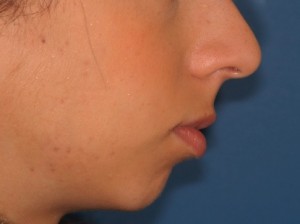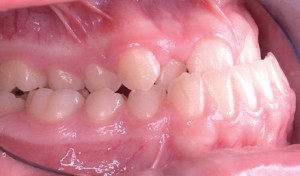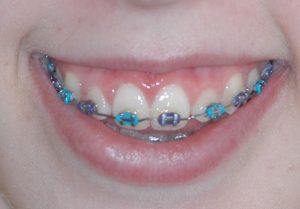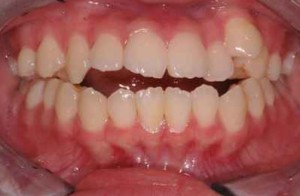If your bite is off, you have a poor smile, or have poor facial balance, you may have problems with your teeth position, jaw size relationship, or a combination of both. Here are the common types of jaw problems:
Short Chin Look with Underbite:
- The lower jaw is under-developed.
- The lower teeth sit further back than normal in relation to the upper teeth.
- The chin often looks short and retruded.
- Correction requires repositioning of the lower jaw forward.
- This is referred to as hypoplasia of the mandible.

Excessive Lower Jaw with ‘Jay Leno’ Look:
- The lower jaw is over-developed
- The lower teeth sit in front of the upper teeth
- The chin looks very strong and pronounced
- Correction requires repositioning the lower jaw backward
- This is referred to as mandibular hyperplasia

Gummy Smile with Large Upper Jaw:
- The upper jaw is over-developed with vertical excess.
- There is excessive gum showing when lips are relaxed and when smiling.
- Correction requires repositioning the upper jaw upward.
- This is referred to as hyperplasia of the maxilla.

Sunken Teeth Look with Small Upper Jaw:
- The upper jaw is under-developed.
- The upper teeth seem sunken in and barely visible, even when smiling.
- Correction requires repositioning the upper jaw downward and forward.
- This is referred to as hypoplasia of the maxilla.
Excessive Upper Jaw with Protruded Look:
- The upper jaw is over-developed in the forward direction.
- The front teeth and mid-face may appear too strong and protruded.
- Correction requires repositioning the upper jaw backward.
Open Bite Look:
- There is an open bite and separation between the upper and lower teeth.
- Usually only the back teeth touch.
- Correction requires repositioning of upper and lower jaws.

Combination Problem:
- A combination problem may occur with any of the above conditions.
- Correction requires repositioning of upper and lower jaws as appropriate.
Why Is It Important to Correct Your Bite?
Having a normal bite and correct jaw relationship improve chewing, speech, and aesthetics, and protect teeth from decay, gum disease, and chipping. Patients with facial pain or TMJ symptoms also report improvements following orthodontic and surgical correction of their bites. Corrective jaw surgery may also improve breathing problems and sleep apnea in certain patients.